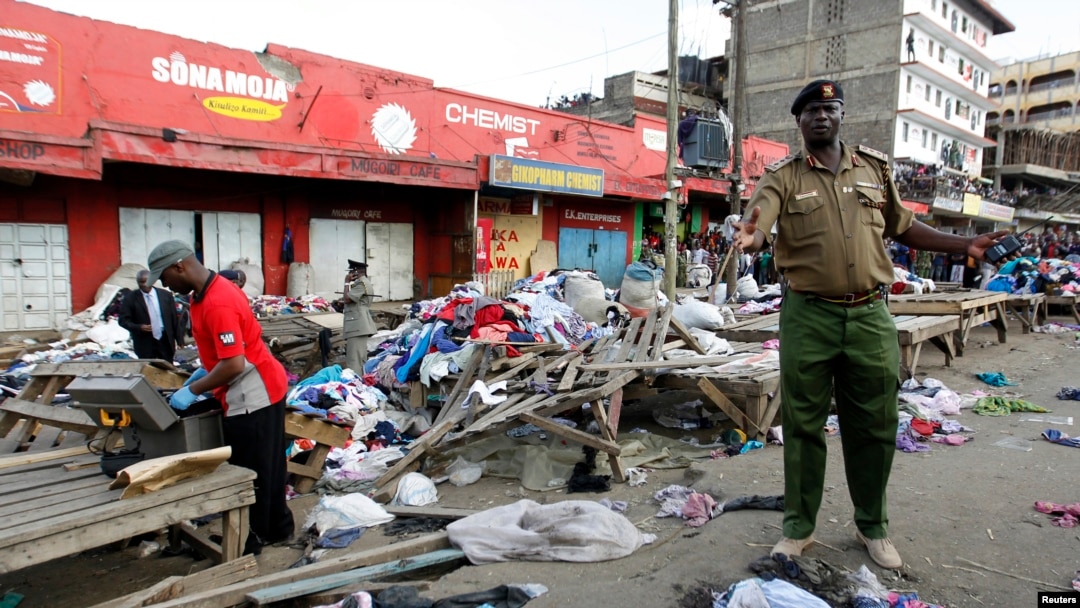NAIROBI —
Somali militant group al-Shabab has vowed to shift its war to neighboring Kenya by sending more fighters to attack government and civilians targets.
Speaking Thursday in the Somali town of Bardhere, al-Shabab commander Fuad Mohamed Khalaf took credit for a Monday ambush on an army convoy near the Somali border in northeastern Kenya that killed 10.
The perpetrators were Kenyan youths that his militant organization had recruited, he said.
“We have trained youths from Kenya, [and] we will be sending them back to their country. The ones we have sent [on Monday] who have killed your soldiers are the ones you have wronged and we will send more,” he said, explaining that he is also calling on Muslim communities within Kenya to take up the fight.
A United Nations report in 2011 said al-Shabab had recruited as many as 500 Kenyan youths. Since then, Kenyan police have arrested dozens of suspected recruits who have crossed back into Kenya.
Investigators have said twin bombings at the busy Gikomba market near downtown Nairobi that killed 10 and wounded at least 70 were carried out by Kenyans. On Wednesday, Nairbobi's Milimani Law Court arraigned Wargue Sar, an 18-year old Kenyan national charged in a May 4 bombing of two public transit buses along the Thika Superhighway.
Al-Shabab's Khalaf is now warning Kenyan officials to prepare for more attacks.
"We are telling them, you should be ready to be kidnapped, [for] women and young male suicide attackers, and [for] more Muslims to fight you,” he said.
Kenyan fighter jets attacked an al-Shabab stronghold and training base as part of an African Union operation against the group earlier this week.
Kenyan forces crossed into Somalia in 2011 to fight al-Shabab. Since then, Kenya has faced a wave of deadly grenade, bomb and gun attacks, most notably the October 2013 attack Nairobi's Westgate shopping mall that killed more than 60 people.
Last month security officials in Kenya launched a crackdown to nab terrorists, their sympathizers and illegal immigrants. Rights groups have complained about the operation, which targeted Somali immigrants in the Eastleigh neighborhood of Nairobi.
Speaking Thursday in the Somali town of Bardhere, al-Shabab commander Fuad Mohamed Khalaf took credit for a Monday ambush on an army convoy near the Somali border in northeastern Kenya that killed 10.
The perpetrators were Kenyan youths that his militant organization had recruited, he said.
“We have trained youths from Kenya, [and] we will be sending them back to their country. The ones we have sent [on Monday] who have killed your soldiers are the ones you have wronged and we will send more,” he said, explaining that he is also calling on Muslim communities within Kenya to take up the fight.
A United Nations report in 2011 said al-Shabab had recruited as many as 500 Kenyan youths. Since then, Kenyan police have arrested dozens of suspected recruits who have crossed back into Kenya.
Investigators have said twin bombings at the busy Gikomba market near downtown Nairobi that killed 10 and wounded at least 70 were carried out by Kenyans. On Wednesday, Nairbobi's Milimani Law Court arraigned Wargue Sar, an 18-year old Kenyan national charged in a May 4 bombing of two public transit buses along the Thika Superhighway.
Al-Shabab's Khalaf is now warning Kenyan officials to prepare for more attacks.
"We are telling them, you should be ready to be kidnapped, [for] women and young male suicide attackers, and [for] more Muslims to fight you,” he said.
Kenyan fighter jets attacked an al-Shabab stronghold and training base as part of an African Union operation against the group earlier this week.
Kenyan forces crossed into Somalia in 2011 to fight al-Shabab. Since then, Kenya has faced a wave of deadly grenade, bomb and gun attacks, most notably the October 2013 attack Nairobi's Westgate shopping mall that killed more than 60 people.
Last month security officials in Kenya launched a crackdown to nab terrorists, their sympathizers and illegal immigrants. Rights groups have complained about the operation, which targeted Somali immigrants in the Eastleigh neighborhood of Nairobi.




